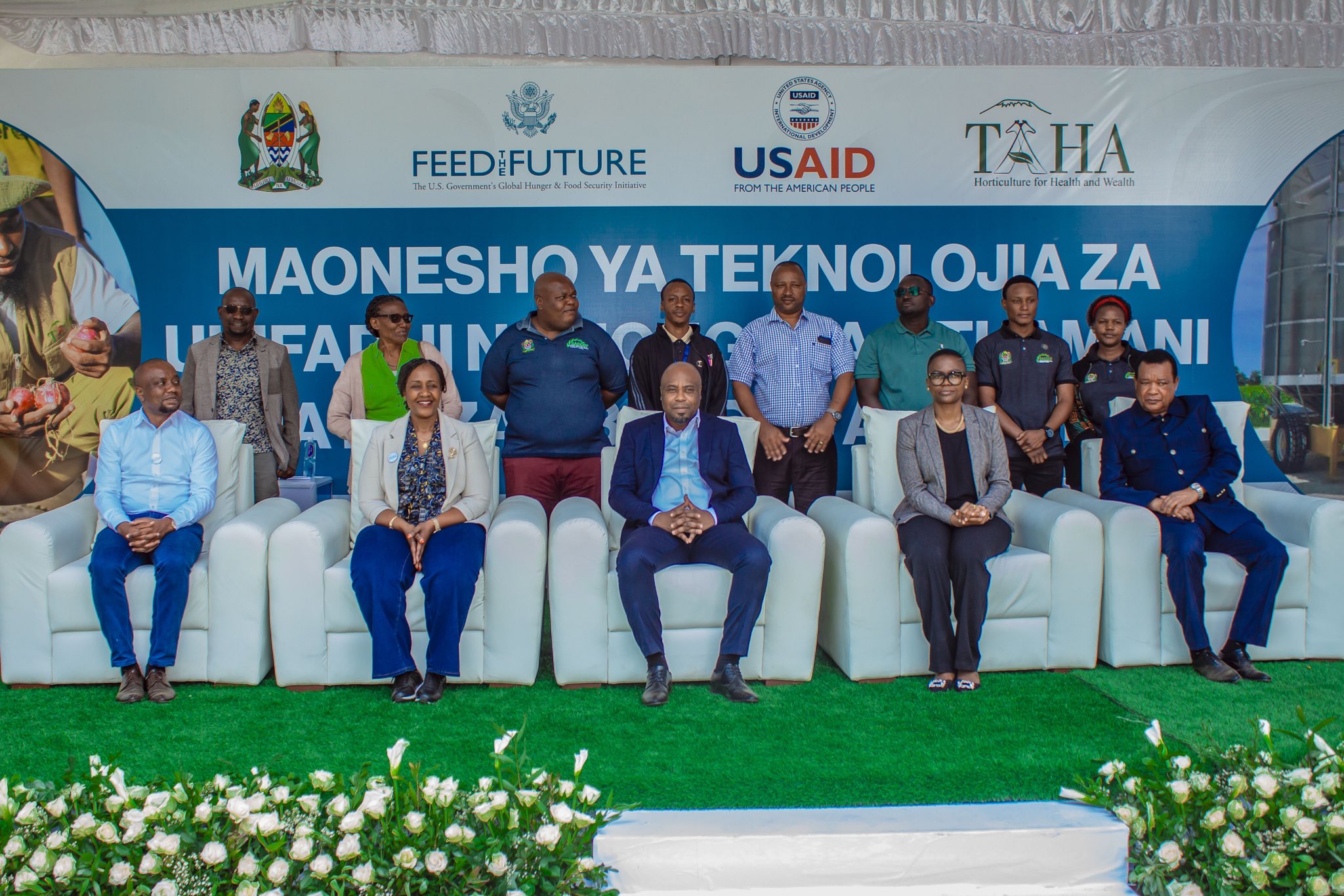Arusha, September 23, 2024 — The Ministry of Agriculture has reaffirmed its commitment to revolutionizing Tanzania’s agricultural sector by enhancing access to modern technologies and fostering closer collaboration with the private sector. This pledge was delivered by the Permanent Secretary of the Ministry of Agriculture, Mr. Gerald Mweli, during the official opening of a two-day Post-Harvest Technology and Value Addition Exhibition, hosted by the Tanzania Horticultural Association (TAHA) under the Feed the Future Tanzania initiative.
The exhibition, held at the National Museum Grounds near the iconic Mwenge Monument in Arusha, brought together stakeholders from across the horticulture and grain value chains. The event spotlighted innovative solutions aimed at improving post-harvest management, adding value to produce, and increasing market access—key steps toward boosting Tanzania’s agricultural productivity.
In his remarks, Mr. Mweli emphasized the Sixth Phase Government’s renewed focus on agriculture, under the leadership of President Dr. Samia Suluhu Hassan. “We have significantly increased the agriculture budget to drive transformative changes for farmers, providing an enabling environment for access to modern technologies and better markets,” he stated. He stressed the importance of these efforts in empowering farmers to boost productivity, improve crop quality, and enhance profitability.
The exhibition provided farmers with a platform to explore cutting-edge technologies in harvesting, storage, processing, and packaging—critical areas where modern advancements can make a substantial impact. These technologies will help farmers reduce post-harvest losses and add value to their products, making them more competitive in both domestic and international markets.
Stakeholders at the event shared insights and collaborated on sustainable agricultural solutions, with discussions focusing on how best to attract lucrative markets and improve smallholder farmers’ incomes. These farmers form the backbone of Tanzania’s agricultural sector.
TAHA’s CEO, Dr. Jacqueline Mkindi, highlighted the importance of ongoing collaboration between the government and the private sector. “This partnership is essential to unlocking the full potential of Tanzania’s agricultural sector. By working together, we can ensure that farmers have access to the technologies, knowledge, and market opportunities they need to thrive,” she said. Dr. Mkindi praised the government’s initiatives and assured that TAHA would continue to support efforts to improve agricultural production and market access.
In addition to TAHA’s role, SAGCOT (Southern Agricultural Growth Corridor of Tanzania) plays a crucial part in implementing the cereals component of the initiative, focusing on grain value chains to improve food security and market competitiveness. SAGCOT’s involvement ensures that modern technologies and market access solutions benefit not only horticultural crops but also cereal farmers, expanding the reach of the initiative to a broader range of Tanzania’s agricultural producers.
The event marks another step forward in Tanzania’s drive toward sustainable agriculture, potentially significantly enhancing farmers’ livelihoods and strengthening the country’s food security. By integrating modern technologies and fostering greater collaboration across value chains, Tanzania is poised to unlock new levels of productivity and competitiveness in its agricultural sector.
Tackling Post-Harvest Losses: The Feed the Future Tanzania Tuhifadhi Chakula Initiative Empowering Youth and Women
Tanzania’s agricultural sector has long faced challenges related to post-harvest losses, particularly in the horticulture and cereal sectors. The Feed the Future Tanzania Tuhifadhi Chakula (Let’s Save Food) initiative is taking direct aim at this problem by introducing climate-smart technologies and fostering stronger market access, to significantly reduce food loss and waste across the country.
The initiative seeks to address food insecurity by slashing post-harvest losses in horticultural crops from 30-40% to 15%, and in cereals from 13% to 7%. These ambitious targets are central to ensuring that Tanzania’s farmers are able to retain more of their produce, translating to increased income, better food security, and greater resilience against economic shocks.
A key aspect of the initiative is its focus on empowering youth and women—two demographic groups that have often been marginalized in the agricultural sector. By fostering their inclusion, the initiative not only enhances livelihoods but also contributes to building a more inclusive and sustainable agricultural sector.
Beyond reducing food waste and improving market access, the initiative also takes a long-term view of environmental sustainability. By addressing inefficiencies in food handling and promoting the adoption of climate-smart technologies, Tuhifadhi Chakula is helping to reduce greenhouse gas emissions associated with food waste. This aspect is critical in a world where agriculture is both a contributor to and a victim of climate change, and it highlights the importance of adopting sustainable practices to protect both the environment and the livelihoods of farmers.
SAGCOT’s Role in Strengthening Cereal Value Chains
A standout feature of the initiative is the involvement of the Southern Agricultural Growth Corridor of Tanzania (SAGCOT), which plays a pivotal role in implementing the cereal component of the project. SAGCOT’s expertise in integrating the private sector and government bodies into agricultural initiatives makes it a key player in ensuring that cereal farmers benefit from post-harvest technologies, better storage solutions, and access to lucrative markets.
SAGCOT’s involvement ensures that the project is able to bridge gaps between smallholder farmers and larger agricultural markets, while also promoting the adoption of modern, climate-resilient technologies in the cereal value chain. By strengthening value chains in cereals—one of Tanzania’s staple crops—the initiative is contributing to national food security goals and ensuring that farmers can produce more, waste less, and sell higher-quality products in both domestic and international markets.

